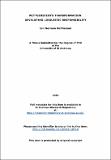Files in this item
Wittgenstein's transformation : developing linguistic responsibility
Item metadata
| dc.contributor.advisor | Shaw, D. W. D. | |
| dc.contributor.advisor | Graham, L. G. | |
| dc.contributor.author | McPherson, Ian Norman | |
| dc.coverage.spatial | 451 p. | en_US |
| dc.date.accessioned | 2017-05-05T10:19:08Z | |
| dc.date.available | 2017-05-05T10:19:08Z | |
| dc.date.issued | 1989 | |
| dc.identifier | uk.bl.ethos.328141 | |
| dc.identifier.uri | https://hdl.handle.net/10023/10710 | |
| dc.description.abstract | This thesis offers a development of work on and with L. J. J. Wittgenstein by R. Bambrough (1969 etc.), S. Cavell (1979 etc.), J. C. Edwards (1982), P. Hacker (1986 etc.), F. Kerr (1986), N. Lash (1988), N, Malcolm (1960 etc.), D. Pears (1987 etc.), D. Z. Phillips (1965 etc.), R. White (1982), P. Winch (1972 etc.) and others. It is argued that all Wittgenstein’s philosophical work coheres with his inclusive spirituality, Jewish and Christian, in seeking to express the dialectics of the sublime in the pedestrian. The most important chapters (one, seven and eight) cannot be fully understood without the others. Wittgenstein’s inclusive concern with transforming philosophy, himself and all friends within reach, expresses his sense of responsibility for the language that we use and have, share and actively are. This intensive and comprehensive responsibility, with eschatological and apocalyptic affinities, shows in his ethics of descriptive grammar. Since languages and concepts are ways and means for procedural knowledge, his ethics of description is also an ethics, aesthetics and theology of perceptive equilibration in understanding, interpretation and family-resemblances. Inclusive spirituality involves Anselmian transcendence. Wittgenstein’s inclusive spirituality is maintained to be a revised and radicalised version of Augustine’s regulative dialectics of inclusive grammar, free from his exclusive theories of language-development and predestination. Wittgenstein’s simplest and potentially most powerful presentation of Augustine’s grammar is the third "great difficulty" in his ethics of 1929. This integrates Wittgenstein’s work as a vital open system, akin to eastern trinitarianism. His dialectics of the sublime are related to William James, Tolstoy, Emerson, Pascal, Hamann, Kant, Schopenhauer, Kierkegaard, Kraus, Weininger, Dostoevsky, Barth and others. Convergences between Wittgenstein and Barth are considered, particularly with regard to the letter's lecture on ethics, published in 1924 (1928 in English), and the beginning of Church Dogmatics (1932 onwards). Wittgenstein's theological and religious reticence is finally argued to be his way of leaving his gift before the place where sacrifice was once offered, as he works on his remembering of unreconciled others. (Matthew 5:23-24). His "third (greatest) difficulty" is the greatest difficulty. | en_US |
| dc.language.iso | en | en_US |
| dc.publisher | University of St Andrews | |
| dc.subject.lcc | B3376.W56M7 | |
| dc.subject.lcsh | Wittgenstein, Ludwig, 1889-1951 | |
| dc.subject.lcsh | Spirituality--Judaism | en |
| dc.subject.lcsh | Spirituality--Christianity | en |
| dc.title | Wittgenstein's transformation : developing linguistic responsibility | en_US |
| dc.type | Thesis | en_US |
| dc.type.qualificationlevel | Doctoral | en_US |
| dc.type.qualificationname | PhD Doctor of Philosophy | en_US |
| dc.publisher.institution | The University of St Andrews | en_US |
This item appears in the following Collection(s)
Items in the St Andrews Research Repository are protected by copyright, with all rights reserved, unless otherwise indicated.

